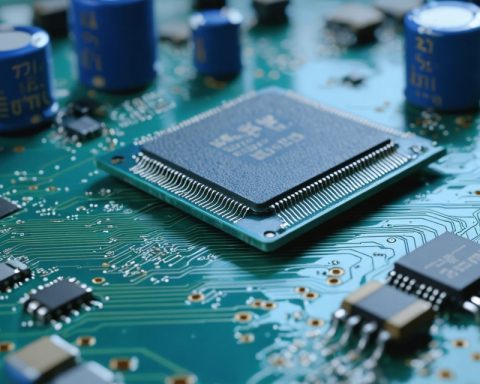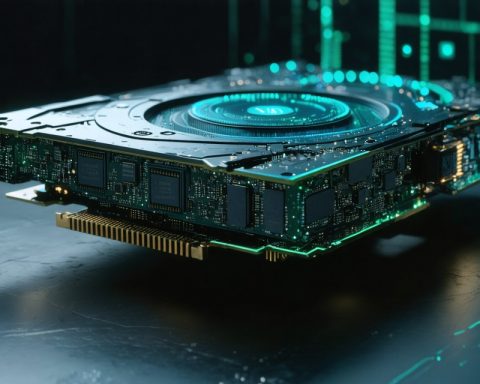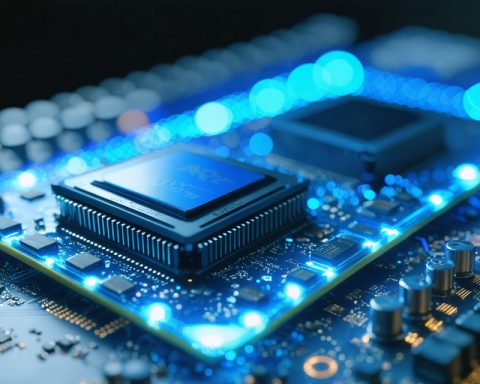Investors worldwide are on the edge of their seats as President-elect Donald Trump prepares to potentially introduce substantial tariffs, particularly targeting China, within the next two weeks. Market analysts are contemplating the scope and potential fallout of these tariffs, especially because previous announcements have fueled tension-filled trade wars, notably with China.
Economic Ripples Through Consumer Markets
Historical data suggests tariffs tend to elevate consumer prices and affect stock market stability. Among the giants of the tech industry, Apple and Nvidia have been significant players in market growth over recent years and stand to face considerable impacts due to the impending tariffs.
Apple, a pioneer in consumer tech, heavily relies on China for both production and sales. In 2023, sales in China constituted about 20% of Apple’s revenue, making it a critical market. The potential introduction of a 60% tariff could inflate iPhone prices significantly, disrupting sales and potentially lowering Apple’s impressive gross margins. Analysts are divided on whether Apple will receive any tariff exemptions, much like in Trump’s previous term. If not, Apple’s position in emerging markets may face turbulence amid increasing local production demands.
Nvidia Faces Uncertainty but Adapts
On the other hand, Nvidia’s situation remains complex amidst geopolitical challenges. Known for its innovations in AI chip design, Nvidia depends on Taiwan Semiconductor Manufacturing for production, which may be troubled by the new tariffs. Taiwan’s representatives have voiced concerns about the significant impact on manufacturing, yet mentioned plans to assist in relocating production.
Nvidia’s CEO expressed confidence in adapting to these challenges by potentially moving operations to alternative facilities, despite potential setbacks in process technology. With robust gross margins, Nvidia is considered better equipped to navigate these changes compared to others.
In this evolving landscape, which company will successfully weather the tariff storm? While uncertainties loom, Nvidia’s substantial margins and strategic flexibility position it favorably, despite the challenges. Meanwhile, Apple’s heavy reliance on China may pose more significant risks under new tariff conditions.
The Tariff Tsunami: How Apple and Nvidia Navigate New Trade Challenges
The world of investment continues to hold its collective breath as President-elect Donald Trump readies his administration to potentially enact substantial tariffs with a marked impact on China. This move could send ripples across the global economy, particularly affecting consumer markets and key technology giants like Apple and Nvidia, whose fortunes are closely tied to their international operations.
Decoding Tariff Implications on Consumer Markets
Historical precedent suggests that new tariffs tend to escalate consumer prices and perturb stock market stability. With major players like Apple and Nvidia at the forefront of technological advancements, they find themselves entangled in the consequences of these international trade shifts. As both companies are integral to market growth over recent years, their strategies to handle potential disruptions could serve as a bellwether for the industry at large.
Apple’s High Stakes in the Chinese Market
Apple, a titan in consumer technology, faces a precarious situation given its reliance on China. In 2023, the Chinese market accounted for approximately 20% of Apple’s revenue, underscoring its importance to the company’s global strategy. The looming possibility of a 60% tariff threatens to inflate iPhone prices, which could impede sales and compress Apple’s typically robust gross margins. This predicament raises questions about Apple’s resilience in emerging markets, especially if the company fails to secure tariff exemptions similar to those during Trump’s previous term.
Nvidia’s Strategic Maneuvering in a Complex Landscape
While Nvidia also stands vulnerable to the potential implications of tariffs, the company exhibits a degree of adaptability in the face of these challenges. Renowned for its advancements in AI chip design, Nvidia is dependent on Taiwan Semiconductor Manufacturing for production—a relationship complicated by geopolitical tensions and prospective tariffs. In light of these uncertainties, Taiwan’s representatives have expressed concerns about manufacturing impacts, but they have also suggested plans for production relocation.
Nvidia’s CEO has voiced confidence in the company’s ability to mitigate risks by exploring alternative manufacturing operations. Despite potential hurdles, Nvidia’s considerable gross margins equip it with the capacity to navigate these challenges more effectively than some of its competitors. This strategic flexibility, coupled with its innovative streak, positions Nvidia favorably amidst the looming trade disruptions.
Future Trajectories: Navigating the Storm
In this volatile economic landscape, the question remains: which tech giant will emerge unscathed from the tariff-induced turmoil? While uncertainties continue to cloud the horizon, Nvidia’s substantial margins and operational adaptability may provide a more favorable outlook. Conversely, Apple’s heavy integration with the Chinese market suggests a potential vulnerability to tariff-induced disruptions.
As we await further developments, investors and market analysts are keenly observing these strategic maneuvers. Companies that can adeptly adjust their strategies to meet new tariff challenges will likely set a precedent for industry resilience.
For a deeper understanding of market dynamics and strategic adaptations in tech industries, consider visiting the technology section of major business news outlets such as BBC and Bloomberg.


















